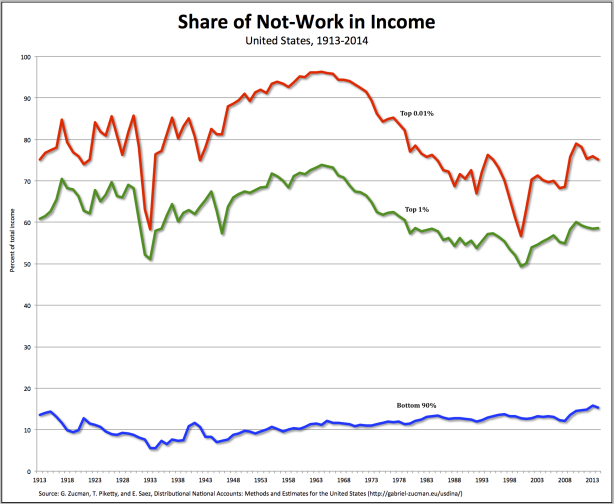From David Ruccio Mainstream economists and economic commentators continue to invoke the so-called “dignity of work” to criticize the idea of a universal basic income. It’s an argument I’ve dealt with before (e.g., here and here). As I see it, there’s nothing necessarily dignified about most people being forced to have the freedom to sell their ability to work to a tiny group of employers. The idea may be intrinsic to capitalism—but that doesn’t mean it contributes to the dignity of people who work for a living, especially when they have no control over how they work or what they produce when they work. Matt Bruenig, to his credit, suggests an alternative argument against the critics of a universal basic income: these writers dislike the fact that a UBI would deliver individuals income in a way that is divorced from working. Such an income arrangement would, it is argued, lead to meaninglessness, social dysfunction, and resentment. One obvious problem with this analysis is that passive income — income divorced from work — already exists. Bruenig is making a distinction between income related to work and income that comes from other sources—passive or not-work—which represents a fundamental divide within contemporary society.
Topics:
David F. Ruccio considers the following as important: Uncategorized
This could be interesting, too:
tom writes The Ukraine war and Europe’s deepening march of folly
Stavros Mavroudeas writes CfP of Marxist Macroeconomic Modelling workgroup – 18th WAPE Forum, Istanbul August 6-8, 2025
Lars Pålsson Syll writes The pretence-of-knowledge syndrome
Dean Baker writes Crypto and Donald Trump’s strategic baseball card reserve
from David Ruccio
Mainstream economists and economic commentators continue to invoke the so-called “dignity of work” to criticize the idea of a universal basic income.
It’s an argument I’ve dealt with before (e.g., here and here). As I see it, there’s nothing necessarily dignified about most people being forced to have the freedom to sell their ability to work to a tiny group of employers. The idea may be intrinsic to capitalism—but that doesn’t mean it contributes to the dignity of people who work for a living, especially when they have no control over how they work or what they produce when they work.
Matt Bruenig, to his credit, suggests an alternative argument against the critics of a universal basic income:
these writers dislike the fact that a UBI would deliver individuals income in a way that is divorced from working. Such an income arrangement would, it is argued, lead to meaninglessness, social dysfunction, and resentment.
One obvious problem with this analysis is that passive income — income divorced from work — already exists.
Bruenig is making a distinction between income related to work and income that comes from other sources—passive or not-work—which represents a fundamental divide within contemporary society.
As is clear from the data in the chart above, very little of the income (15 percent in 2014) of the bottom 90 percent of Americans stems from not-work (and, even then, most of their apparently not-work income is actually related to previous work, in the form of pension incomes). However, for the tiny group at the top, most of their income (59 percent for the top 1 percent, 75 percent for the top 0.01 percent) is related to not-working (and, of course, most of their work-related income is based on sole proprietorships and elevated executive salaries). In other words, most of their income represents a claim on the extra work performed by others.
So, when critics of a universal basic income rely on the “dignity of work” argument, what they’re really doing is reinforcing the idea that most people can and should derive dignity from working for a small group of employers. At the same time, critics are presuming there’s no loss of dignity for the tiny group at the top, those who have managed to capture most of their income from sources related not to their own work, but the work of everyone else.*
Where’s the dignity in that?
*Now, it’s true, as Noah Smith observes, “many rich people believe that investing constitutes work.” But spending a few minutes a day reading the business press and examining alternative investments does not constitute work—at least as most people understand what it means to work. Or are those rich people referring to the fact that they hire a whole host of other people, from financial advisors to accountants, to do the actual work of managing their not-work investments?

